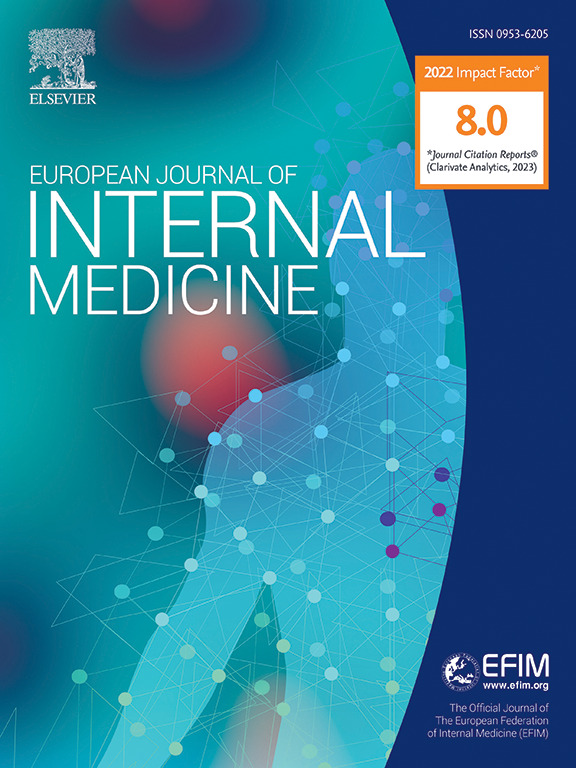Doppler ultrasound unveils splanchnic arteries ischemia allowing early successful revascularization in symptomatic systemic sclerosis patients
IF 5.9
2区 医学
Q1 MEDICINE, GENERAL & INTERNAL
引用次数: 0
Abstract
Background
Systemic sclerosis (SSc) is characterized by macro and microvasculopathy, including splanchnic circulation. Chronic mesenteric ischemia (CMI) is a potentially severe condition which can complicate SSc gastrointestinal vasculopathy. Doppler ultrasound (DUS) may be a non-invasive procedure for identifying CMI in symptomatic SSc patients.
Objectives
To investigate the capacity of DUS to detect early CMI and the effect of the endovascular approach on CMI-related symptoms.
Methods
DUS of splanchnic arteries was performed in symptomatic SSc patients, during routinary outpatient visits.
Results
In 6 out of 72 SSc symptomatic patients, DUS suggested a splanchnic vessels stenosis which was confirmed by computed tomography angiography (CTA). After multidisciplinary evaluation in 3 patients a revascularization was performed. Three-monthly clinical and DUS follow-up was negative in all patients.
Conclusion
CDU is a useful screening tool for CMI in SSc patients. Revascularization of stenotic mesenteric arteries seems to be a safe and effective procedure.
多普勒超声揭示内脏动脉缺血允许早期成功的系统性硬化症患者血运重建。
背景:系统性硬化症(SSc)以包括内脏循环在内的大血管和微血管病变为特征。慢性肠系膜缺血(CMI)是一种潜在的严重疾病,可使SSc胃肠道血管病变复杂化。多普勒超声(DUS)可能是一种非侵入性的程序,以确定CMI症状SSc患者。目的:探讨DUS对早期CMI的检测能力及血管内入路对CMI相关症状的影响。方法:对有症状的SSc患者在常规门诊期间进行内脏动脉DUS检查。结果:72例SSc症状患者中有6例DUS提示内脏血管狭窄,经ct血管造影(CTA)证实。经多学科评估,3例患者行血管重建术。3个月临床和DUS随访均为阴性。结论:CDU是SSc患者CMI的有效筛查工具。肠系膜动脉狭窄的血运重建术似乎是一种安全有效的手术。
本文章由计算机程序翻译,如有差异,请以英文原文为准。
求助全文
约1分钟内获得全文
求助全文
来源期刊
CiteScore
9.60
自引率
6.20%
发文量
364
审稿时长
20 days
期刊介绍:
The European Journal of Internal Medicine serves as the official journal of the European Federation of Internal Medicine and is the primary scientific reference for European academic and non-academic internists. It is dedicated to advancing science and practice in internal medicine across Europe. The journal publishes original articles, editorials, reviews, internal medicine flashcards, and other relevant information in the field. Both translational medicine and clinical studies are emphasized. EJIM aspires to be a leading platform for excellent clinical studies, with a focus on enhancing the quality of healthcare in European hospitals.

 求助内容:
求助内容: 应助结果提醒方式:
应助结果提醒方式:


